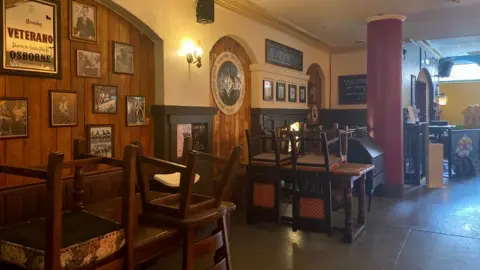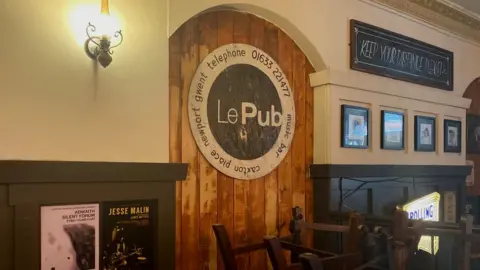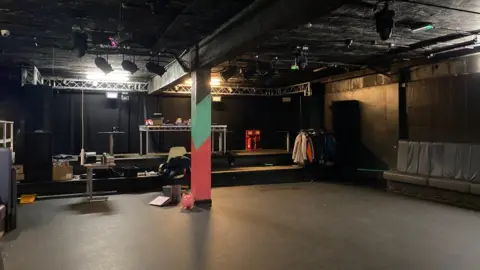Coronavirus: Welsh music venues warn many could never reopen
 BBC
BBCIndependent music venues and nightclubs say the industry in Wales will not survive without financial help.
Safety kit and reduced capacities due to social distancing would cost more than £10m a year, a report has said.
Sam Dabb, of the Music Venue Trust in Wales, said her venue would not be financially viable with capacity cut from 200 to just 17 due to coronavirus.
The Welsh Government has announced £53m help for the arts and said details of how to apply would be available soon.
In May, it also said it would give funding of more than £400,000 to 22 grassroots music businesses.
The report into the financial impact of coronavirus restrictions on music venues in Wales found the annual cost of keeping the sector closed would be £6.46m.
But it said the minimum annual cost of reopening the sector using 2m social distancing guidelines would be £10.37m.
That included the loss of money by operating at reduced capacity, as well as the cost of safety measures, including plastic screens, barriers and deep cleaning.
'We cannot do gigs under social distancing'

The Music Venue Trust represents 66 grassroots organisations across Wales.
Ms Dabb is its Welsh co-ordinator and runs Le Pub in Newport.
Before coronavirus struck, it was holding five club nights and gigs a week.
"The capacity is 200, but with people coming and going throughout the evening we would have around 500 people here on a Saturday night," she said.
"There's nothing coming in and we have massive overheads going out. We're scrambling around the venue looking for things to sell so we can make some money."
She said the £400,000 funding in May was not enough.
"It was only for eight weeks at the start of the pandemic. So by week nine there was nothing coming in again.
"Venues in Wales have been lucky to get that support, but it's still been really tough.
"We cannot do gigs under social distancing, at 2m the venue has a capacity of 17. It isn't financially viable.
"So we need support to be able to remain closed until there's a vaccine or until the virus isn't as dangerous."

Gary Lulham, who owns Sin City in Swansea, said any events planned for this year have now been cancelled.
Stormzy and Ed Sheeran are just some of the artists who have previously performed there.
"The initial grant from the government was fantastic and the furlough scheme was fantastic. Without that support we wouldn't be here now," he said.
"But the ongoing costs now and the uncertainty of the future means we are in a very precarious financial position.
"When the furlough scheme comes to an end it seems that we will stop trading around January.
"We are hopeful we'll get some extra help from the recently announced support from the Welsh government, but without help soon it'll be the end of it."
He added: "I think the guidance is sparse from the authorities because they don't know what to do with it. It doesn't seem safe to reopen and allow people to dance and mingle.
"The community spirit and the support we've had from the general public has been absolutely incredible, and has been a real driving force for wanting to get through this, and showing the reason that there is a need to get through this."
 Sin City
Sin CityOne organisation is also concerned young people are becoming "socially starved".
Michael Kill, chief executive of the Night Time Industries Association, said: "An increasing number of illegal parties are being organised up and down the country, showing that people are now creating their own social environments in potentially unsafe unregulated environments.
"We need the Welsh Government to produce a clear roadmap for the opening of the night-time economy, without this we are hugely concerned for the future for nightclubs, venues and late bars."
A Welsh Government spokesperson said: "We understand the concerns from the sector, but we need to ensure organisations and individuals can return to performing and rehearsals in a safe manner.
"The coronavirus crisis has not gone away and the first minister has been clear that for the next few weeks, safely reopening all schools has to be the key priority.
"But ministers review all the restrictions in place at each review period - and then decide what, if anything, can be changed."
